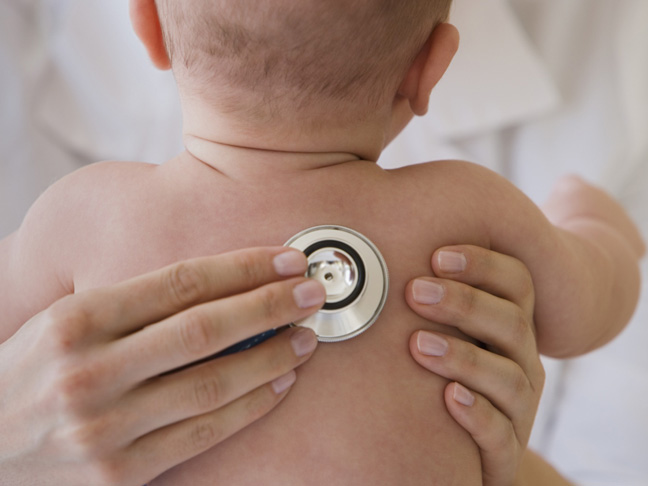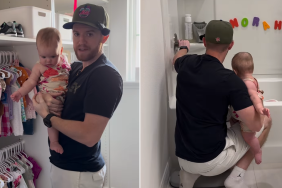I’m not only a pediatrician who is an expert in newborn baby care, I’m also the mom of three young boys. So I can completely relate to what you as a new parent of a newborn are going through. There’s a new human living in your house, and she’s completely dependent on you — but she can’t tell you what she needs yet. You’ve maybe never cared for a baby before, so you’re trying to figure out everything as you go. On top of all that, you’re probably not getting very much sleep. It can be hard to know exactly what to do. You may feel like you have a million questions, but rest assured: It’s totally normal to feel that way. Pretty much all of my patients come in with a list of questions whenever they bring their newborns to see me (yes, even the second- or third-time parents who have been through the drill before). Here are the most common questions about newborns that I — and all the other pediatricians in my busy New York City practice — hear all the time, with answers, as well as signs that you need to check in with your pediatrician.
1. Q. What color, consistency, and frequency should my newborn baby’s poop be?
A. When a baby is first born, his poop will be dark and tarry looking. This is called meconium. As your breast milk comes in (or your baby starts to bottle-feed), his poop will change in both color and consistency. The poop will be yellow, orange, green, or brown in color, with a consistency that’s like cottage cheese, toothpaste, mustard, or honey. It will be very loose. If it were your poop you would think you had diarrhea but this is normal for babies. You may find that the poop squirts out at you during a diaper change. Sometimes, you may find that your baby poops so much it goes up his back (this is normal as well). Call the pediatrician: if your newborn poops more than 15 times in a day, has bloody poop, has not peed for over six hours, seems to be in pain, or is feeding poorly.
2. Q. My newborn is a few weeks old and she’s pooping less. Is something wrong with her?
A. Around 3- to 4-weeks of age, some children will start to poop less. There is a wide variety of normal in this age group. Some children poop six to seven times a day and some once a week. As long as her poop is soft in consistency and is of one of the normal colors noted above, your child is not constipated. It is also normal for children in this age group to strain when pooping; she may even get all red in the face and frustrated and may even cry. This is because infants have weak abdominal muscles and use their entire body to poop. The most important factor in determining constipation in an infant is the consistency of her poop. Call the pediatrician: if her poop is hard like little pellets; she may be constipated.
3. Q. Is my newborn baby eating enough?
A. Newborns need to feed frequently — every two to three hours (or 8-12 times/day), on average. Until your baby is back at birth weight you should wake him up after three or four hours of uninterrupted sleep. This scheduled feeding strategy will quickly evolve into an on-demand feeding strategy as your baby grows and you feel comfortable with your own milk production (if you are breast feeding) and your baby’s cues. You will know this by the number of wet diapers your baby is having. By the fourth or fifth day of life, a well-fed baby poops four to five times a day (or even every time he eats) and has five to six wet diapers a day. Call the pediatrician: if your newborn hasn’t pooped in more than 24 hours, or he seem lethargic or fussy.
4. Q. When can I take my newborn out in public?
A. You may take walks with your newborn once you feel up to it. However, you should avoid crowded/enclosed spaces, including airplanes, until after she’s received her two-month vaccines; those spaces increase her risk of getting sick. Call the pediatrician: if you have questions about whether a place is “safe” for your baby; we’d rather you ask than take a chance.
5. Q. What should I do about cradle cap?
A. The medical term for cradle cap is seborrhea. It appears as scaly, flaky patches on the scalp, which may look yellow and greasy and can sometimes have some redness. No one knows the exact cause of cradle cap. One theory is that hormones passed from the mother can cause a build-up of oil in the oil glands and hair follicles. Another theory is that non-harmful yeast causes cradle cap. While it bothers parents because it can look unsightly, cradle cap is not dangerous or harmful to babies. It typically does not bother your baby and is not contagious. The good news is that most cradle cap goes away within a few months. Call the pediatrician: if your baby’s scalp is very itchy or is bleeding; it may be another skin condition.
6. Q. Is it normal for newborns to be congested and sneezing?
A. Newborns breathe much better through their noses than through their mouths. They have small nasal passages so any little bit of congestion can make their breathing sound very noisy; they may even sound like a washing machine when breathing. The only way for your baby to clear his nose is by sneezing, which explains why newborns sneeze a lot. Typically, the congestion bothers the parents more than the baby. If he is happy and feeding and sleeping well there is no reason to intervene. In fact, trying to suction his nose will only annoy him and suctioning too much can actually lead to increased congestion by irritating the nasal passages. If your baby is bothered by the congestion you can use some nasal saline drops and suction to help make him more comfortable. Keeping a cold mist humidifier running will also help. Call your pediatrician: if your infant is less than two-months-old and has a temperature 100.4 or above, is feeding poorly, is irritable, is having persistently rapid breathing, has a change of color to the lips to pale or blue, or if you have any other concerns.
7. Q. Is it normal for my newborn baby to spit up?
A. All babies spit up some. We worry about spit up when babies are not gaining weight well or seem to be in a lot of pain when eating. It is also concerning if babies spit up green (like the color of a Christmas tree) or have multiple episodes of forceful vomiting in a row. Call your pediatrician: if you notice any of these red flags.
8. Q. My newborn has green goop coming out of the eyes. Does she have an eye infection?
A. Luckily, the likely answer is no. It is common for babies to get clogged tear ducts. In this case, the white of the eyes are white and there is no redness or swelling or the eyelids. There will be some yellow-green colored discharge from your baby’s eyes and at times there may be a large amount of discharge. You will also notice the affected eye seem to be watery and tearing. The good news is that clogged tears ducts typically self-resolve by the time babies are 9-months-old (if not, your pediatrician will refer your child to an eye doctor). Call your pediatrician: if you notice signs of infection, which include redness in the white part of the eye, eyelid redness or swelling, and/or a hard bump at the corner of the eye.
More for Moms With A Newborn Baby:
- What is Cluster Feeding & Is it Something to Worry About?
- Ear Infection Symptoms You Should Never Ignore
- New Mom Life: 10 Things I Rely on to Get Through the Day
- Why You Should Never Have House Guests Right After Having a Baby
- How to Tell If Your Baby Has Webbed Toes
Photo: Getty








